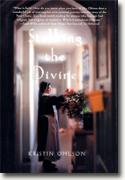Stalking the Divine
Kristin Ohlson
book reviews:
· general fiction
· chick lit/romance
· sci-fi/fantasy
· graphic novels
· nonfiction
· audio books
· author interviews
· children's books @
curledupkids.com
· DVD reviews @
curledupdvd.com
newsletter
win books
buy online
links
home
for authors
& publishers
for reviewers

 |
Stalking the Divine: Contemplating Faith With the Poor Clares Kristin Ohlson Hyperion Hardcover 256 pages August 2003 |
|
Kristin Ohlson had a mission. She wanted to write a book about nuns. A lapsed Catholic and freelance writer, she forged a connection with St. Paul Shrine, an inner city Cleveland church which housed within its walls a group of Poor Clares, an order dedicated to continual prayer.
Ohlson wanted to know, as does the reader, what it feels like to be in the company of other women only in almost total silence in a single small enclosed home for life. But Mother James, with her sharp Boston accent, kept trying to set the author straight: "There you go about feeling again...I told you before, it's not about feeling. You can't go by what you feel. You have to go by what you know -- that God is there, and you're doing your best in all things." Clare of Assisi, a rich, beautiful woman, founded her order of Poor Clares against opposition from the Pope and the Church hierarchy. She wanted women to live the simple rule of poverty practiced by St. Francis. In those times, women who became nuns often enjoyed a life of relative ease, even of luxury, paying large dowries to the church and living lavishly on the proceeds. For many, life in a convent was an escape from the burden of wealth that forced them into unwanted arranged marriages in which they would be totally powerless. In the religious life at least they had some sense of accomplishment - feeding the poor, nursing the sick: "There seems to have been a loathing among these noblewomen for their own assets." Ohlson draws a number of threads together in weaving her story of the nuns of the St. Paul Shrine. There is her own personal longing "to reach the belief side of the chasm." There is the history of the once-grand building itself, stuck in the middle of what gradually became a degraded and inhospitable neighborhood, and the saga of the coalescing of the enclosed order of sisters within it. Each sister that Ohlson interviewed as she herself was drawn towards their simple life, had a different story, a different perspective, even a different accent. Living so long together, she observed, had not changed their multitude of speech patterns - then she learned that they spoke together only 45 minutes each day. There is Sister Maria, who wanted to be a nun "from the first grade, if you can believe that," but was unable to take her vows until she was almost fifty. There is Sister Thomas the artist, who lived fully and "thought of this [convent] life as a kind of prison." Sister Bernadette, "the Poor Clare who dives for the sports page every day," found the cloister at first too communal - she had longed for the deprivations of the hermit saints. As the author interviews the sisters behind the screen that obscures them from public view, and the priest on the other side who manages the church for a dwindling congregation, she examines her own faith life. When her mother becomes critically ill, the sisters pray for her, and there is a "miraculous" recovery, though not sufficiently miraculous to lead Ohlson back to full membership in the church. At the latter stage of her quest, she asks "if the church even wanted someone like me," and is told, "Take your time. Stay with it." There is never a sense that anyone expects to convert her back to Catholicism away from her skepticism and rational questioning of Church doctrine. But "they do think that God drew me to the shrine for some sort of purpose - of course they would think that, because that's what people like them think." Ohlson gives dignity to her subjects, these contemplative sisters who believe that they have a vocation to pray for the world, that "some things only happen through the intercession of prayer," as Mother James expresses it. It is an idea as old as worship itself, and one which finds resonance in other religions as well. The author poses the obvious question to Mother James: "If everyone stopped praying, would goodness dry up and evil run rampant?" And Mother James responds, as we know she will, "It won't happen. That won't ever happen."
|
|
|
|
 Click here to learn more about this month's sponsor! |
|
| fiction · sf/f · comic books · nonfiction · audio newsletter · free book contest · buy books online review index · links · · authors & publishers reviewers |
|
| site by ELBO Computing Resources, Inc. | |
 Immuring -- the practice of enclosing a religious person within walls for
life -- seems to almost anyone outside to be a form of torture. Perpetual
prayer, the practice of improving the world just by praying for the relief
of its many sufferings, seems to almost anyone outside to be if not
futile, at least hopelessly idealistic. Ohlson met and talked with women
who had volunteered for both these experiences.
Immuring -- the practice of enclosing a religious person within walls for
life -- seems to almost anyone outside to be a form of torture. Perpetual
prayer, the practice of improving the world just by praying for the relief
of its many sufferings, seems to almost anyone outside to be if not
futile, at least hopelessly idealistic. Ohlson met and talked with women
who had volunteered for both these experiences.